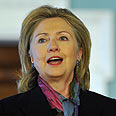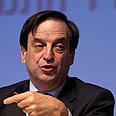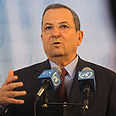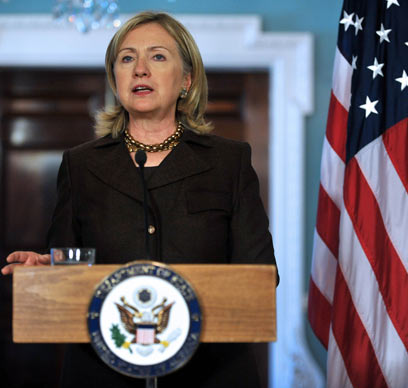



Other ministers. However, welcomed some of Clinton's comments, saying she put an end to a preliminary discussion on security borders, "which is a good thing for us."
Although the secretary of state did not use harsh words, she was critical of Israel. She slammed the settlement construction, addressed each of the negotiations' core issues – including Jerusalem and the refugees – and demanded a clear stand from both Israel and the Palestinians on these matters shortly.
Jerusalem is now waiting for US special envoy George Mitchell's return to the region for another round of shuttle diplomacy between Israel and the Palestinian Authority. Mitchell is trying to form an outline for the talks and receive the sides' stance on the core issues, including Jerusalem and the borders.

Clinton. Didn't skip any core issue (Photo: AFP)
"The US is implying that it will activate its Plan B, and they're going in that direction," said one of the ministers, who is also a member of the Political-Security Cabinet. "The prime minister must bring his principles to the negotiating table. It's not necessarily bad that the Americans are putting a plan on the table. It will force the sides to present their stands, and Israel must do so too."
Meridor: 'Security borders first' over
Minister Dan Meridor, who is currently in Washington, said that "Clinton's speech was pretty foreseen."
According to Meridor, "There are some good things in the speech – Clinton was very firm about not going to the UN, and that's a very important thing as far as we are concerned. She said there would be a simultaneous discussion on five issue, and that puts an end to the 'security borders first' story. She also stressed Salam Fayyad's moves and the need for trust-building measures ahead of a Palestinian state. These are very important elements."
As for the border issue, Meridor told Ynet, "It's very important that Israel presents a stand on the borders. Not a final stand, and we don't have to draw a final line, but there is a need for an Israeli stand. In addition, stances must be presented on all issues."
Meridor was unmoved by Clinton's remarks on an American plan. "She said that at a certain stage bridging offers would be presented. They would not be presented at the advanced stages of the negotiations, while the gaps are very big, but rather towards the end. It's all being said in a pretty vague manner. I don't see any major problems here as far as Israel is concerned."
Vice Premier Silvan Shalom expressed his satisfaction with the fact that "the Americans realized at a delay that focusing on the settlement freeze was a mistake."
According to Shalom, "The entire freeze issue was a burden on the peace process, didn't help and only caused the entire process to fail. Now that the burden has been lifted, there is a chance for a real process which will discuss all the core issues – the refugees, Jerusalem, the holy places, the security arrangements and the Hamas rule in Gaza. In any case, the negotiations must not focus on the borders."
Minister Isaac Herzog (Labor) called on Netanyahu to form a political outline which would include the permanent borders, based on the 2000 Clinton plan. He demanded that Netanyahu coordinate with the coalition faction, have the cabinet approve the plan and put it on the negotiating table.
"The current Israeli interest is to accept the secretary of state's call and act in full and tight cooperation with her, in order to courageously move towards a solution of the core issues opposite the Palestinians," Herzog said.
The social affairs minister added that "this is Netanyahu's moment of truth, both on the international level and on the political level – with the Labor party. Netanyahu must understand that he has a short window of opportunities. He is expected to demonstrate decisiveness, courage and flexibility.
Transportation Minister Yisrael Katz, one of Netanyahu's associates, told Ynet that "the lines will not be predetermined. Even (Defense Minister Ehud) Barakrejected the American offer to put a plan on the table. No one will agree to predetermine the borders. We have an interest in other things first, not necessarily regarding the borders."
'Labor has a new excuse not to quit'
Meanwhile, coalition officials estimate that returning the peace process to the public agenda and Clinton's speech will postpone Labor's plan to quit the government."Labor now has another excuse to stay in the government, to wait and see where the peace process is going," said a senior Likud official close to the prime minister. "The problem now is the timetable of (Histadrut Chairman) Ofer Eini, who called on Labor to quit the government if the process is not resumed. In any case, Barak and the other ministers will play for time now."
A source close to Netanyahu took the same line, saying that "Labor is stalling. Barak traveled to the United States to ensure that the Americans are putting the peace talks back in the picture. He needs negotiations, in order to delay the possibility of Labor quitting the government in the near future."
Aviad Glickman contributed to this report
- Follow Ynetnews on Facebook















